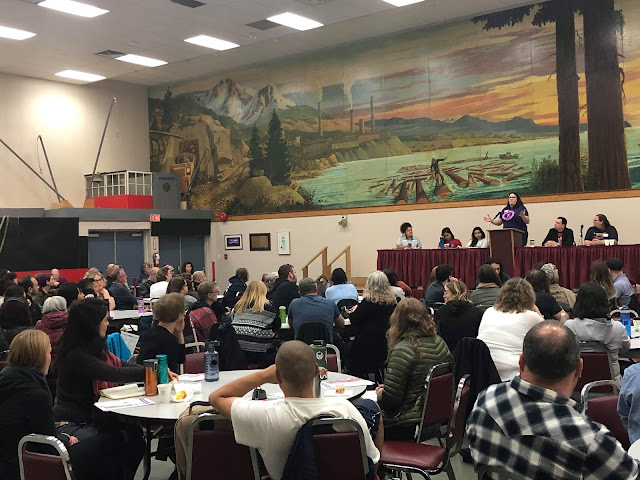Bottom Line Conference 2018 - Day Two
The morning started off with the chair of the CMHA Board of Directors addressing the conference. Then I was up next to bring greetings on behalf of the BC Federation of Labour since Irene was unable to attend, so as chair of the Fed’s OHS committee I was happy to step in.
How to Get Ready for Cannabis in the Workplace – Dr. Dave Hepburn – doctor, columnist, and medical researcher
 This one was a tough session to get through – not because the material was difficult or boring but because the presented himself was abrasive and offensive. Starting off a session at a mental health conference joking about sexual harassment is not ok and I sent the conference organizers feedback regarding this particular person.
This one was a tough session to get through – not because the material was difficult or boring but because the presented himself was abrasive and offensive. Starting off a session at a mental health conference joking about sexual harassment is not ok and I sent the conference organizers feedback regarding this particular person.
The focus on this session was looking at how we are going to have to adapt our thinking around cannabis in the workplace especially when it becomes legalized in 2019. There are so many factors to consider when it comes to cannabis. The plant itself carries nutritional, medical and industrial factors. He spent a lot of time explain the science of the endocannabanoid system (ECS) and how it works physiologically. At the end of the session he encouraged employers to review their drug policies and said outright that mandatory drug testing is an empty relic and that we should be shifting to impairment testing instead (when people show signs of impairment not simply because THC shows up in a drug test).
Panel: For Moral to Medicinal and Beyond: New Approaches to Substance Abuse in the Workplace
- Dr. Gerald Thomas – Director of Alcohol, Tobacco, Cannabis and Gambling Policy
- Dr. Nadia Fairburn – Scientist, BC Centre for Substance Abuse
- Joanna Gislason – Human Rights Lawyer
 This panel focused on the legal, medicinal and moral implications of cannabis in the workplace. There is significant concern that the government is once again profitizing an addictive substance. We covered the tree of addiction which is a visual representation of how trauma, abuse and neglect are the soil where the roots of addiction are buried. They also went into great detail on the duty to accommodate and how drug policy and discipline policy need to have clear outlines.
This panel focused on the legal, medicinal and moral implications of cannabis in the workplace. There is significant concern that the government is once again profitizing an addictive substance. We covered the tree of addiction which is a visual representation of how trauma, abuse and neglect are the soil where the roots of addiction are buried. They also went into great detail on the duty to accommodate and how drug policy and discipline policy need to have clear outlines.
Things to consider in our workplaces:
- Perception of being stoned – and how to deal with the stigma of being a cannabis user
- Embedding rehabilitation and recovery into primary care because people get better
- Shift to impairment testing and ensuring supportive measures are in place in case someone needs help – zero tolerance policies are also problematic
- Care needs to be individualized
- Morality fills the gap when people lose the ability to feel (recovering our capacity to connect when things are not going well)
- Look to other countries to see what’s working - Uruguay went from prohibition to corporatization in weeks!
CMHA 100th Anniversary
It was the 15th anniversary of the Bottom Line Conference and the 100th anniversary of the Canadian Mental Heath Association. We each got a candle, they dimmed the lights and as a slideshow that depicted the 100 year history of CMHA, 3 opera singers performed a song (dirgey). It was quite moving and amazing to see how things have changed over the past 100 years.
World Cafe: Mental Health and the Future Workplace
We spent about 80 minutes discussing mental health and the future of our workplaces through three lenses; role of leaders, bullying, stigma. We were a diverse group – people from Whitehorse, Victoria, Ontario and Saskatchewan and had great discussion. It was interesting to hear that people seem to still equate management and leadership. They aren’t the same thing and managers need to be reminded of that. If you can get your leaders on the worksite to buy into any programming it will be that much more successful. Anyway, it was a good practice to have conversations about what we could do in our workplaces with people I normally wouldn’t encounter.
Learning from First Responders – Trudi Rondou
This session was to promote the Worksafe BC’s First Responders Mental Health Committee’s campaign “share it, don’t wear it.” There are 13 organizations representing on the committee including CUPE 873, our BC Ambulance Paramedics (shout out). This campaign targets different groups – first responders themselves (for self-assessments/tools), as colleagues/friends/family (for support to help them support their loved ones or coworkers, and to help them through the difficult time of their loved one going through something traumatic or difficult). It’s more than a website though – there are seminars and presentations being made all over the province.
Since the roll out of the campaign they’ve seen:
- 500 BC first responders recalled seeing the campaign
- 62% indicated that they were more likely to speak us
- 56% said they would seek support now
- 83% likely to share the website and resources
- 73% are more likely to seek support than before
There are unique challenges to being a first responder and by recognizing this, the campaign is tailored to their situations and helping them cope with the daily traumas they seem sometimes multiple times a day.
I stopped by their booth to learn more and 2 members of CUPE 873 approached me to thank me for mentioning them in my speech earlier in the morning. They told me more about their campaign and I suggested that we get them to present to the CUPE BC convention in April.
Into the Fire and Out Again – Darrel Reid, Chief, Vancouver Fire and Rescue Services
I learned all kinds of things about firefighter culture in this presentation. The context of firefighting has changed over decades. Now, firefighters have to deal with so many different factors that have changed the way they do their jobs and have added more stress:
- · Opiod crisis – in Vancouver, firefighters can have 5-12 critical calls in a shift
- · Light weight modern construction projects (because of the materials used, they burn 4-5x faster than older builds) which result in higher intensity fires
- · Liability
- · Complex specialities like High angle rescue, Ice rescues,Boat operations
- · Compassion fatigue
 In 2017 in Canada, there were 46 first responder suicides, 14 in BC. Yikes. First responders have unique challenges – there are things you can say to your fire family that you couldn’t say to your home family (dark, morbid or shocking to regular people but that’s how you cope).
In 2017 in Canada, there were 46 first responder suicides, 14 in BC. Yikes. First responders have unique challenges – there are things you can say to your fire family that you couldn’t say to your home family (dark, morbid or shocking to regular people but that’s how you cope).
The most powerful part of his presentation was showing us a picture of him and his buddies from the mid 1990s. He brought us up to date about where that group of eight young men are today.
· 15 marriages between them
· 1 who suffers from anxiety, OCD and depression – not working
· 1 with PTSD – not working
· 3 cancers
· 1 addict
· Him
· One suicide – that came after he retired
It became clear that support and meaningful intervention is needed for people where it’s not obvious they are struggling. We delved more into the uniqueness of fire culture. How to react when a team member dies on the job, impact of formal funerals where thousands of first responders show up in their dress uniforms (most first responder suicides – they are found in their dress uniforms) vicarious trauma for family members, compassion fatigue, taking care of the fallen comrade’s family, missing personal events because you’re called away in an emergency...and so much more.
It sounds like there is a positive shift for mental health supports which is good. He made it clear that one of the most important things he’s done is to ensure he’s kept friends not in the fire service so that it’s not shop talk all the time.
I really appreciated his honesty when sharing the challenge of a changing organizational and professional culture.
Overall this was a great conference – it challenged my ideas of resiliency and stress. It gave me great insight into various topics in the field of mental health and now I have a plethora of great resources which will help tremendously in supporting our members.







Comments
Post a Comment